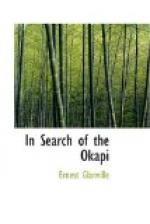“There’s nothing wrong with him,” said Mr. Hume, with a smile. “Now we’ll get him out of that and fix him up comfortably. I like his looks, and have hopes that he will be useful.”
They removed him to a deck-chair, whither he was followed by the jackal, who was in such a state of suspicion that he declined food.
“What I think,” said Mr. Hume, in answer to the boys, who wanted his explanation, “is this—that the man and the jackal have come from the interior.”
“From the Great Forest?”
“Probably from the Great Forest; for these reasons—that the men who shaped the canoe had no knowledge of the coast-built craft with their high bows; that the man is of a different race from the coast tribes; and because the jackal, from his dark markings, is evidently from a thickly wooded region. That is merely a theory, which does not help us much, and certainly does not explain how he came to be bound and gagged in a canoe at sea hundreds of miles from the forest. However, the main point is that we have got him, and having got him, will keep him.”
“Against his will, sir?”
“Oh, I reckon he will be only too thankful for our protection.”
“I should think, sir,” said Venning, “the fact of his totem being an otter proves that his tribe derives its living mainly from fish.”
“That is plausible; but it may, again, be a sign of chieftainship, and a chief I have no doubt he is. Maybe he was sent adrift by some rival faction; but that can scarcely be, for he would not have survived a long journey; and, again, the canoe would have gone aground.”
“There is another explanation,” said Compton, with a grin. “He may not have come down the river at all. He may have been set adrift from one of those ships we passed for insubordination.”
“Ships do not carry canoes or jackals,” said Venning, who had made up his mind that the castaway was from the forest, and from nowhere else.
They went down to breakfast, and the morning was occupied in getting their kit and packages together. At noon the steamer was berthed at a pier, and their packages were transferred to a paddle-wheeler, which was to take them over three hundred miles up the wide estuary to a Belgian station. Thence, perhaps, they would proceed hundreds of miles further by another river steamer before they took to their own boat.
“Why, we may be days before we really get to work,” said Venning, when the vastness of the Congo was forced on his attention by a casual reference to “hundreds of miles.”
“Days—weeks, my boy, before we come to the fringe of our field. The river is more than half the length of the Continent; its length is half the distance by sea from Southampton to the Cape, and, next to the Amazon, it pours a greater body of water into the sea than any river in the world.”
“Africa,” said Compton, “seems to be the driest and the wettest, in parts, of any country; and all its great rivers, except the Nile, run to waste.”




